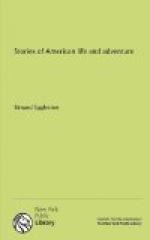But when they got to a country where it was not raining all the time, they had a way of keeping dry at night. They had brought along sleeping bags. These were made of waterproof linen. Each bag was a little longer than a man. It had draw strings at the top. They put a folded blanket inside, and then pushed the blanket down with their feet so that it would wrap about them and keep them warm. Then they drew the strings about the top. This kept the body dry.
They suffered a great deal from hunger. There were very few animals in the country where they were, and most of the Indians they found had but little to eat. Lieutenant Allen’s party were sometimes glad to pick up scraps of decayed meat or broken bones about an Indian camp to make a meal on. Much of the meat and fish they had to eat was badly spoiled. They grew so weak that it was hard for them to climb up a hill, carrying their guns and their food. They sometimes reeled like drunken men when they walked.
They would have perished from hunger if they had not had a man with them who knew how to stop the rabbits when they were running. This man could make a little cry just like a rabbit’s cry. Whenever a rabbit heard this sound, he would stop and look round for a moment. Then the hunter would have a chance to shoot him.
But these rabbits were so small and so lean that it took four or five of them to make a meal for a man. At one place the party were so hungry that an Indian who was with them fainted away. When they reached a house soon after, where there lived a chief named Nicolai, they found a five-gallon kettle full of meat boiling on the fire. They drank large quantities of the broth, and ate about five pounds of meat apiece. Much of this meat was pure tallow from the moose. They all fell asleep immediately after eating. When they awaked, they were almost as hungry as before.
At last they reached the head waters of the Copper River. Here they found the hungry Indians waiting for the salmon to come up from the sea, as they do every year. As long as the salmon are in the river, the Indians have plenty to eat. So they kept dipping their net, hoping to catch some salmon. At last one little salmon was caught. It was a thin, white-looking little fish. The Indians now knew that in two or three days they would have plenty. They hung their little fish on a spruce bough, and they kept visiting it, singing to it with delight. The white men did not wait for the salmon to arrive.
From this place they left the Copper River, and started to cross the mountains. This was the pass through which it was said that nobody could go. Lieutenant Allen and his men were obliged to carry provisions with them. Part of the provisions they carried themselves: the rest they packed on dogs. This is a way of carrying things used only in Alaska. A pack is strapped on a dog’s back just as though he were a mule, and with this the little dog goes on a long journey through the mountains.




